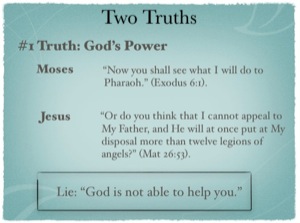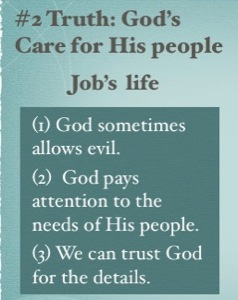
Discipleship Level 2: Reaching Beyond Mediocrity
Rev. Paul J. Bucknell
Depression in the News | Obtaining Hope | Emotions, Feelings and Depression
Gaining Discernment | Root Cause| The Path (5Ds)
Hope Through Obedience | A Strong Shield | Rebuild Foundation
Deeper Trust | Two Truths | Deliverance Cycle
![]()
Exercises#1-5 | Handout | Video Podcast | D2 Index | RSS
![]()
Two Truths Needed to Heal Depression
Two Truths Needed to Heal Depression, part 11 of 12, shows how two truths are critical to know and embrace in order to overcome depression. Do you know what they are or how they help? 'Adopting God's Hope, Overcoming Depression' is the ninth lesson in a series on "Reaching Beyond Mediocrity."
There are two major truths that need to be stressed when personally confronting a person with depression.
The doubts have to do with the unbelief in God's power and His ability to help us cope with some situation. These two truths stand to ward off and cast off any kind of despair and depression. This is the shield of faith we need to hold up. Before discussing these truths, let us understand that we are talking about real difficult life situations.
Recently I heard from a pastor in Africa that his daughter has Yellow Fever. This pastor and his wife need to trust God through this episode. His daughter is 27 and has two children. To make this situation more difficult is the death of the pastor's big 22 year-old son last year from pneumonia.
Do you see the way despair can settle into someone facing such difficult situations if these truths are not embedded in his heart? Is God able to help? Will He help? These are the two truths that we must straight on. This pastor is not alone in facing many difficult challenges. He will be challenged in His trust of the Lord. Now let's look at these two truths.
#1 Truth: God's Power
Is God able to help? Does God have the power to help? Does He have the authority to help? All these questions challenge the truth of God's might. The Lord indeed is sovereign and does as He pleases.
 In Moses' situation, God affirmed His power. "Now you shall see what I will do to Pharaoh…" (Exodus 6:1). Never is it a question whether God was able to help. Jesus had to face this temptation on the cross. He heard the evil one whispering through his disciples.
In Moses' situation, God affirmed His power. "Now you shall see what I will do to Pharaoh…" (Exodus 6:1). Never is it a question whether God was able to help. Jesus had to face this temptation on the cross. He heard the evil one whispering through his disciples.
"Then Jesus said to him, "Put your sword back into its place; for all those who take up the sword shall perish by the sword. "Or do you think that I cannot appeal to My Father, and He will at once put at My disposal more than twelve legions of angels?" (Matthew 26:52-53).
First Jesus had to counter the delusion that mere weapons can overcome the evil one. Behind this thinking is the wrong idea that man can get done what God could not. This is a subtle attack on God's power. "He is not powerful enough. We will have to help Him get things done."
Or a more direct attack, "God is not able to help you." Note how Jesus responded. He pointed out that God could easily help if He thought it best. "He will at once put at My disposal more than twelve legions of angels."6 In a moment's notice Jesus could have more than 80,000 angels at his beckoning. These were powerful angels not men.
What did Jesus do?
He fought insinuations and lies with truth. He did not let the lies darken the skies about God's power.
Theologically, we know God is all powerful, but we sometimes doubt this truth when we see Him not doing anything about a situation that we care about whether it be the poor, the sick or abused. Instead of doubting the truth of God's power, it would be much more helpful if we straightened out our understanding of how God uses His power.
The Lord never said He had to use His power every moment He could. If He did, I suppose His wrath would be released upon our lives before Christ ever came to save us. The issue is never about power.
God makes the dead to come alive, the blind to see, the earth to be made. The scriptures are clear about God's sovereign power. No one comes close to Him. He only allows the evil one, demons and man for a time to openly rebel. This does not show weakness but displays greater power. God's power is of such a nature that it can incorporate defiance.
Most of us 'believe' God is all powerful but the weakness of our faith is shown when in crisis we wonder if God could have helped. Perhaps a more difficult area to work through is whether God cares for us.
#2 Truth: God's Care for His people
Did Job know what was happening in the heavens when he lost his family, wealth and health? No. Did God care for Job? Certainly. The Lord was displaying Job as a great example of a man with faith and integrity.
Job's story is important because it helps us to see how God sometimes operates. If we always judged our situation from what we see happen to us, then we will at some point be deluded. The Book of Job does recognize God's power. Job's friends associated blessing with righteousness and curse with sin. They did not have a place for the righteous person who suffered. This was Job's story. He is in the scriptures to affirm that what we always see does not with a 100% accuracy predict a person's character. There is more to the equation, and one needs faith to see those parts.
Job certainly looked cursed from man's perspective. The truth is that Job was highly praised from God's perspective. Sometime, to be honest, we suffer because of our sin. We should 'get' the obvious connection between our sin and our consequence. Jacob under Laban's care was a perfect example. (See Appreciating God's Discipline on Jacob).
Let's think of an example. Perhaps a wife says something that bothers her husband, and he screams back. He did not follow the principle 'respond with a gentle answer' from the scripture, "A gentle answer turns away wrath, but a harsh word stirs up anger" (Proverbs 15:1). So now both of them are angry and critical to each other–not talking to each other. This worst situation is an obvious consequence of not following the Lord's admonition. This is not what we speak of here, but we need to keep an eye out for these connections.
From Job's example, we should understand that a righteous man or woman might lose their financial security, job, family members through death or even one's own health. Satan wants to bring us to defeat and defamation, but God has His greater purposes.
 We can see Satan's desire to ruin God's people (actually any people) since it is the only way he can make a mark against God. He does not want God's people to reflect the Lord's glory. When he enticed God in Job, he secretly wanted to destroy Job and his righteous life. Read carefully and understand Satan's purpose.
We can see Satan's desire to ruin God's people (actually any people) since it is the only way he can make a mark against God. He does not want God's people to reflect the Lord's glory. When he enticed God in Job, he secretly wanted to destroy Job and his righteous life. Read carefully and understand Satan's purpose.
"And Satan answered the LORD and said, "Skin for skin! Yes, all that a man has he will give for his life. "However, put forth Thy hand, now, and touch his bone and his flesh; he will curse Thee to Thy face." So the LORD said to Satan, "Behold, he is in your power, only spare his life." Then Satan went out from the presence of the LORD, and smote Job with sore boils from the sole of his foot to the crown of his head" (Job 2:4-7).
Let us draw three points from this passage to support this overall truth of God's care for His people.
-
God sometimes allows evil.
The first point here is to see that God sometimes does allow bad things to happen to good people. God has purposes that go beyond our own personal purposes. We do not need to understand them to trust God. We trust Him despite what happens to us. God is in control. As we trust Him, He loves to further reward and use our lives.
-
God pays attention to the needs of His people.
Second, we should see that God has a great concern for His people. He notices when they obey Him and greatly delights in them. When Job went through these many crises, God was greatly delighting in Him. God was taking care of Job. From the way that God set the limit, "Only spare his life," we see that God had concern for Job. Nothing could happen that was not within God's permissive will.
-
We can trust God for the details.
Third, we can trust God for the details of what happens to our lives and grace for what does happen. In the first series of events, the Lord did not allow the evil one to touch Job's health.
In a similar way, the Lord shapes everything that happens to us so that we can succeed (1 Cor 10:13). Nothing ever is beyond what we can handle. This truth is one of the greatest to help a person encounter the impossible. If God allows some difficult situation to arise in our lives, then He will give us grace to cope. The truth builds up faith and trust in how God will help us to cope.
When a person says, "I could never do what you are doing? There might be some truth to it." Since God has not given them that particular circumstance, it might be quite true, at least at that point, that they could not handle it. But if they were, then they would have access to God's power to endure. Surely here we see God's abundant care for His people.
When a believer has any responsibility, then he can be sure that God will give him or her grace.7 There is no temptation, no situation, no attack from the enemy, that we cannot properly handle through God's grace.
The evil one does his very best to get us to doubt on these two major truths. If we trust the Lord, then Satan is kept away by the Lord.
See how the cycle of deliverance from depression sums up the steps to overcome depression and secure God's hope.










